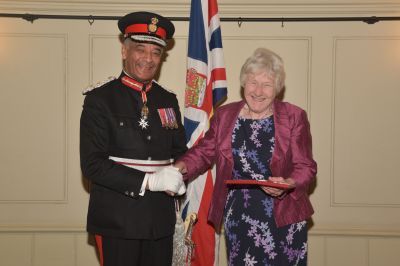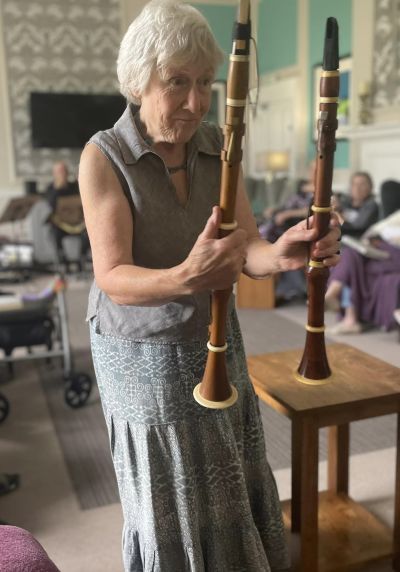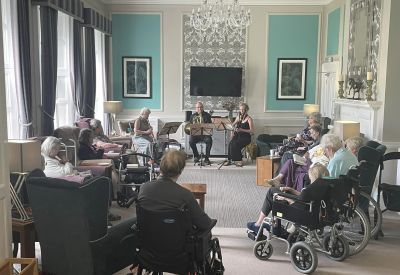Breadcrumb navigation
Alumni Careers: “Guildhall set me on a journey of discovery that continues today"

A conversation with alumna Margaret Archibald BEM (Clarinet 1970).

What made you choose to study at Guildhall?
Up to the age of 18 I sang, played the clarinet, studied the piano and immersed myself in non-stop music-making, with my great ambition to be the next Joan Sutherland! I chose Guildhall because of its reputation for singing and the packed curriculum of the Graduate Course.
How would you describe the atmosphere and culture at Guildhall School during your time there? What did it feel like to walk into the building?
I studied at Guildhall from 1967 to 1970 when we were still in the old building in John Carpenter Street. You had to be careful not to be taken out by a News Standard van whipping round the corner from Fleet Street, and the peaceful gardens of Lincoln’s Inn were only a short walk away. The building was a bit down-at-heel and the waiting room just inside the front door was the place where everyone congregated, unless they wanted to climb the many stairs to the canteen at the top of the building. The atmosphere was busy and friendly, with marked contrasts between the extrovert singers and the more conservative instrumentalists. I still have many wonderful friends from my three years as an undergraduate.
And are there any specific memories or performances that you had at Guildhall that stand out?
Every day as I surfaced at Blackfriars Underground station I was presented with the wonderful sight of St Paul’s Cathedral, an inspiration shared by Peter Wishart who used to glance out of the top floor window during his History of Music lectures and pause to remark on its great beauty. On my very first day, after 40 minutes of a late afternoon Analysis of Music lecture, Professor Alfred Nieman startled us shy newbies by stamping his foot and shouting “Sparkle, damn you!”
My General Musicianship professor was Harold Dexter, whose passionate commitment to music and his students was both terrifying and inspiring. There were several mature students in our year, including a trumpeter who used to come in each day from Hemel Hempstead on the Green Line bus with her white cane because she was nearly blind, and Harold always said that her presence, character and determination created a very special atmosphere within our year group.
For me, it became apparent as time went on that my singing was not up to the standard of my clarinet playing and that life as an opera star was unlikely to be the outcome of my studies. I have always been truly thankful that Guildhall, with its team of dedicated and sometimes eccentric teachers, gave me a solid grounding in basic musical understanding, something I could never have achieved simply through practising my singing or my clarinet. It set me on a journey of discovery that continues today with every piece I study and every pupil I teach.
What is a typical day in the life like for you?
My career has been so varied that it’s hard to define a ‘typical’ day. Early on, I taught in schools and privately, sang in church choirs, including seven years at the London Oratory, freelanced as an orchestral player for everything from choral society gigs to West End shows, taught Music Appreciation evening classes, wrote programme notes, compiled the artists’ biographies for the 1973 Proms, and even translated sleeve notes from French to English.
In 1979 I was given the opportunity to become involved in the period instrument movement and over the ensuing decades I built up a collection of historical instruments, all with different fingering and tuning issues, and of course different reeds!
Back on my modern blackwood clarinet I became a member of the London Mozart Players in the mid ‘80s and in 1989 I was thrilled to be asked to set up the first year of the education and community work that formed part of the orchestra’s new residency in Croydon. This work became my obsession and 21 years later I set up my own charity Everyone Matters to continue serving local communities through music.
Now, if any day is ‘typical’, it involves a lot of emails and general administration work, often some teaching, always some clarinet practice, sometimes some piano practice, days out with colleagues giving concerts in care homes or leading workshops in schools, still some orchestral playing including with the Hanover Band and, when the lawn is too long or the carpets too gritty, some mowing or some hoovering.
Where can people find out more about your work?
What has been your career highlight since leaving Guildhall School?
My career has brought me such richly diverse musical experiences that it’s impossible to choose one highlight, but just once or twice in my entire career I’ve experienced a kind of weightless absorption when the physical act of playing my clarinet has melted away and I’m flying free.
On a more practical level, I especially value the intergenerational projects where I collaborate with local schools to create a programme for a group of young musicians who rehearse alongside visiting professionals and their own music staff, and then all perform together in local care homes.

What are your hopes for the future?
I’m trying to develop a profit-making side to Everyone Matters that can subsidise our core work in care homes, special schools and the wider community. There’s a long way to go, but I feel as though I’ve embarked on an exciting new journey. Most of all, for myself, I hope to enjoy the good health that will enable me to continue making music with my wonderful colleagues.
What piece of advice would you give to our students/recent graduates who are starting out in your profession?
Secure a source of income that will give you the basics of life while at the same time allowing you enough freedom to accept the work you really want when you are offered it. Keep practising, be honest to the music you perform, be prepared to accept work in a very wide range of genres, be a good friend to your colleagues, generally say yes to everything unless you’re already booked and don’t let your goals out of your sight!
How has the industry evolved since you graduated, and how have you adapted to these changes?
In the 1970s, my career began amidst thriving amateur choirs, music clubs, orchestras, opera companies, and bustling studios recording classical music, film scores and BBC radio content. My perception is that the scene has steadily shrunk, and that far fewer musicians can expect to earn a fully viable income from performing alone.

On the other hand, there are multiple career opportunities in teaching, coaching, music therapy, publishing and retail, as well as openings for musicians who enjoy performing and leading workshops in a wide range of community settings. I suppose you could say that I adapted by embracing outreach projects early on, but I did so because I passionately believed in the value of the work.
I feel very fortunate that many of the loveliest moments of my career have come about through engaging with people of all ages, from nurseries to nursing homes, schools to day centres, and our loyal concert audiences.
I’ve been inspired by working alongside hundreds of committed professionals in many different fields, enjoyed meeting thousands of members of the public and, above all, I’ve been privileged to work collaboratively with inspirational musician colleagues who remain some of my closest friends. Throughout the ups and downs of a turbulent freelance career I’ve subscribed to the line from Dryden that stands as the motto of Everyone Matters, “Music for a while shall all your cares beguile”.

